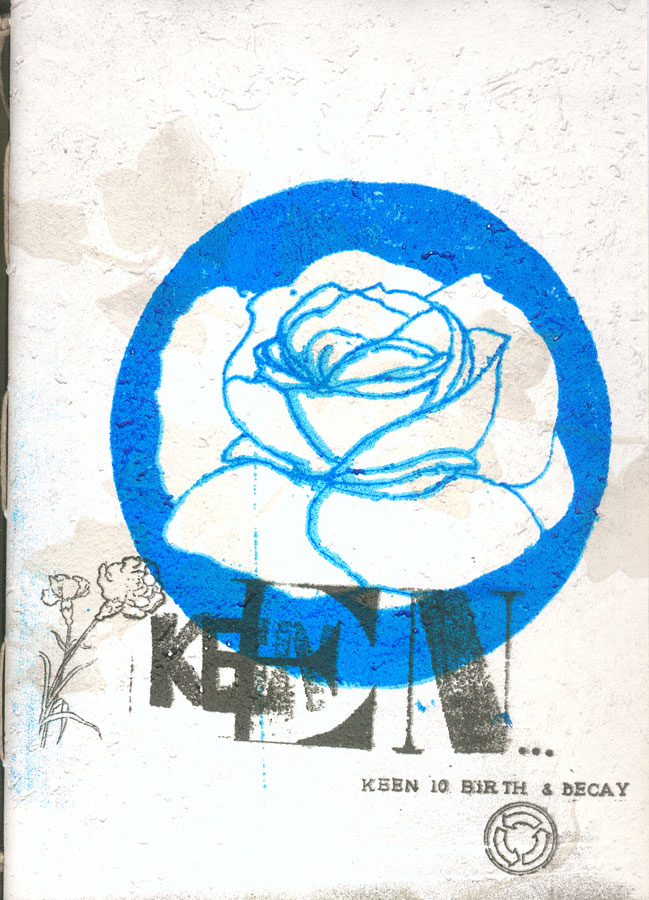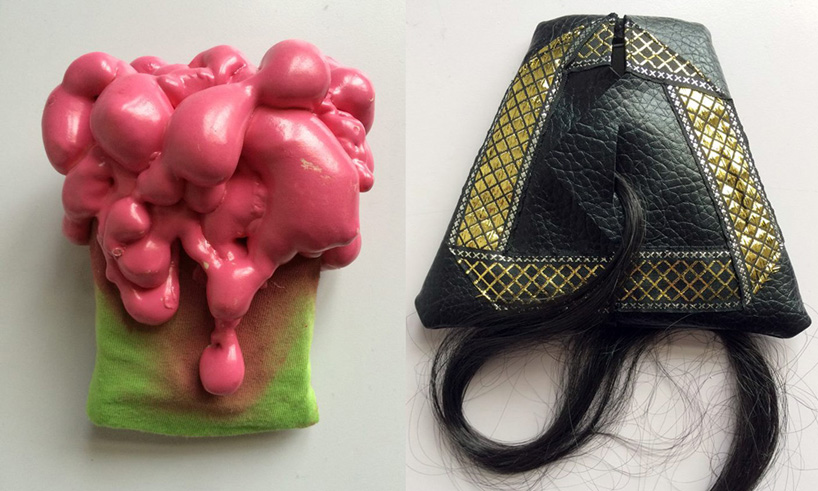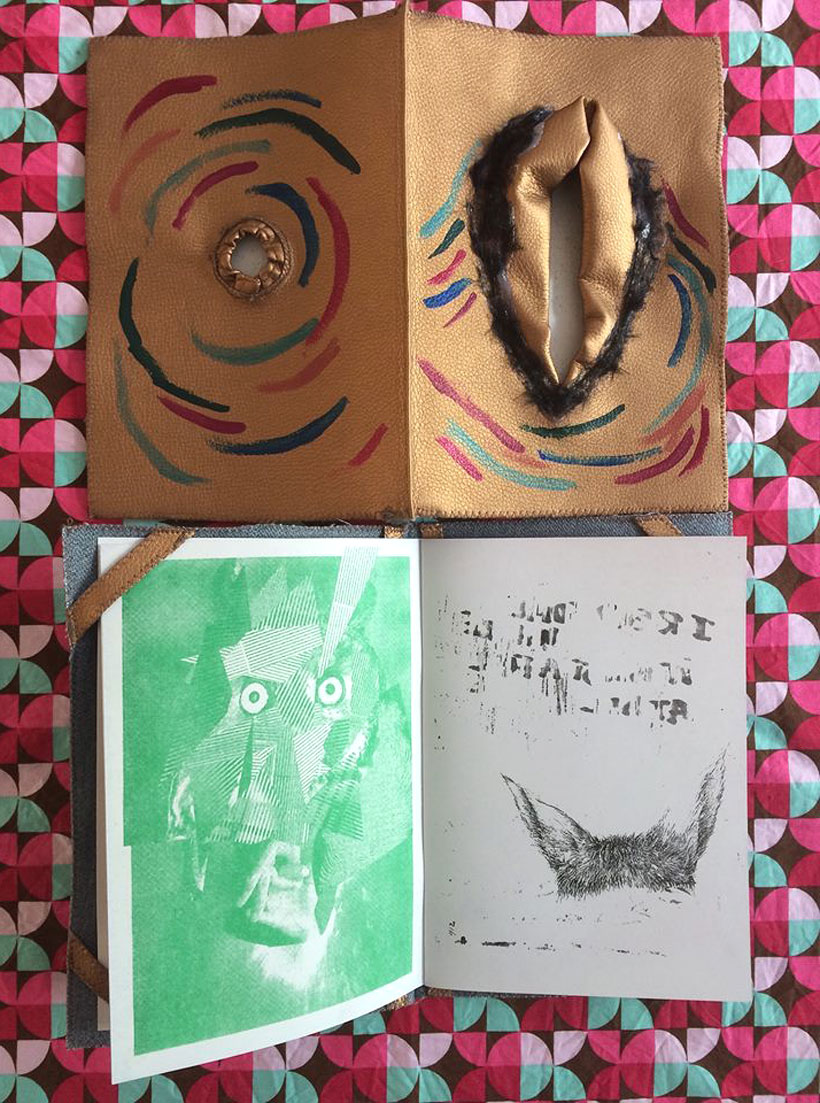The Birth & Decay issue is the last in a series of Keen Zines that was initiated by Djuna (Keen) Michielsen at the age of 18. Over the years a total of ten zines was published. With this final issue Djuna Keen decided to ‘close the circle’. Keen Zine #10 is ‘an ode to life and an homage to all the contributors of the previous issues’, explains Djuna Keen in her introduction. The hand bound issue contains 48 xeroxed and colour xeroxed pages of artworks and texts and comes with a 1h:18 audio CD of music by related artists’ bands, one track of which is by Djuna Keen’s own band The Joyous Cosmology. Contributors to the zine include Ludo Mich, Wataru Kasahara, Karen Constance, Djuna Keen, Laetitia Lemaire and John Godbert. The cover of the zine was designed by Djuna Keen and silkscreened on wallpaper. The magazine was published in October 2015 in a limited edition of 100 numbered copies. → order now
Ludo Mich – My Tailor Is Rich &
The Making Of by Louis Goyvaerts
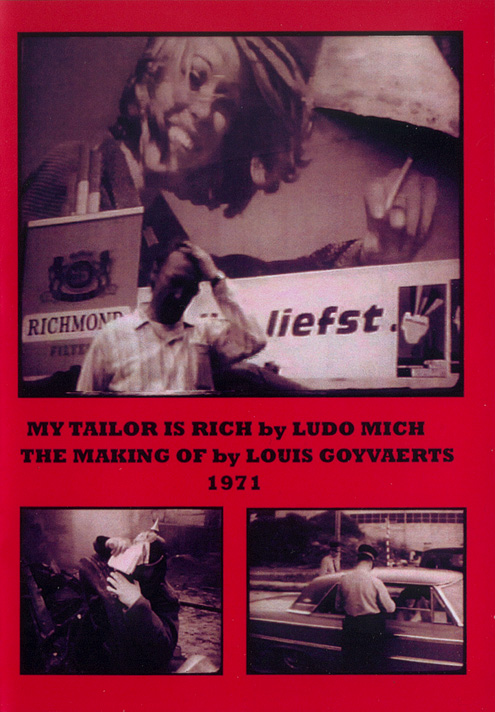 My Tailor Is Rich is an underground film by Ludo Mich after a one-act play by Werner Verstraeten. The film – now on DVD – was originally shot on 16mm in 1971. ‘My tailor is rich, but my English is poor’ is the first phrase of ‘L’Anglais sans peine’, an English method for French-speaking people written by Alphonse Chérel in 1929. Chérel’s method of acquiring English inspired Eugène Ionesco’s to write his absurdist debut ‘La Contatrice Chauve’ (The Bald Soprano) in 1950 and, no doubt, Ludo Mich refers to this particular play in the title of his own absurdist piece.
My Tailor Is Rich is an underground film by Ludo Mich after a one-act play by Werner Verstraeten. The film – now on DVD – was originally shot on 16mm in 1971. ‘My tailor is rich, but my English is poor’ is the first phrase of ‘L’Anglais sans peine’, an English method for French-speaking people written by Alphonse Chérel in 1929. Chérel’s method of acquiring English inspired Eugène Ionesco’s to write his absurdist debut ‘La Contatrice Chauve’ (The Bald Soprano) in 1950 and, no doubt, Ludo Mich refers to this particular play in the title of his own absurdist piece.
My Tailor Is Rich tells two tales simultaneously: one is about a father who – dressed in pyjamas – is trying to find his daughter Nicole in the alternative circles of 1971 Antwerp, and the other is about a mother who is looking for her son Heinz, who is seen wandering on an imaginary battlefield. To heighten the sense of absurdity and alienation, there is no chronological order of events and the scenes are all set in different spans of time, varying from Antwerp and Paris in 1971 to a WWI battlefield. The film switches from urban wastelands, contemporary young people hanging out, smoking and selling hash to killing, rape and looting on a battlefield. Derroll Adams, a folk singer from Portland Oregon who had found refuge in Antwerp as a draft dodger in the 1960s, makes his appearance in the film. So do Guillaume Bijl, Jozef Hermans, Paula Van Belle and other fiends and artists. War and anti-war themes emerge from the non-linear story only to merge into a hallucinatory absurdist piece, beautifully filmed by Ludo Mich.
‘The Making of My Tailor Is Rich’, which is an interesting cinematographic document itself, was originally shot on Super-8 by Louis Goyvaerts during the filming of ‘My Tailor Is Rich’in 1971. The document was provided with a new soundtrack by The Joyous Cosmology in 2015. The Joyous Cosmology are Djuna (Keen) Michielsen, Nicolas De Clippele, Frank Vranckx and Maarten Tibos. The soundtrack was mixed by Mark Rietveld. → order now.
William Levy – Alien Bread
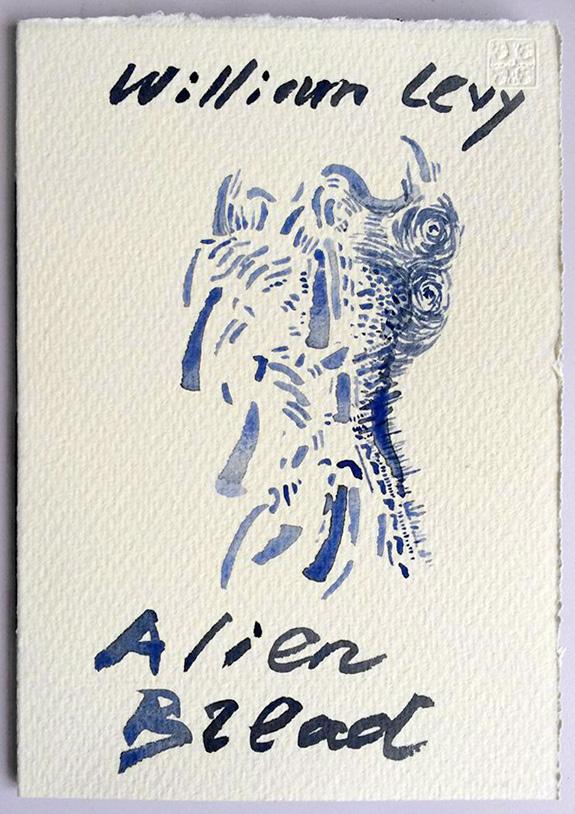 The fourth in the series of Sea Urchin chapbooks is the first publication of William Levy’s poem Alien Bread.
The fourth in the series of Sea Urchin chapbooks is the first publication of William Levy’s poem Alien Bread.
William Levy (Baltimore, 1939) attended the University of Maryland and Temple University and taught in the literature department at Shippensburg State College, Pennsylvania, during which period he co-founded the ‘Insect Trust Gazette’, a poetry magazine which – among others – published William Burroughs. Levy developed into a spearhead of the European underground soon after he had left the US in 1966. As chief-editor of the underground magazine ‘International Times’ and the first European sex paper ‘Suck’, Levy found himself refused entry to England as a “thoroughly undesirable character” and a “dealer in pornography” in 1970. After having been detained in England for a week, Levy was given the choice of either going to Holland or being sent to an English prison. Levy chose the former and settled in Amsterdam, where he has lived since. ‘Alien Bread’ is a sublime existentialist poem which, once printed, spreads out in a gently undulating shape on the page. The poem is met – both in contents and shape – by an illustration by Ben Schot that can be viewed from different angles. Alien Bread is manna from dark heavens.
New in our No Basement Is Deep Enough catalogue
Todd Tamanend Clark’s ‘The Deathguard Remnants‘ (2014) and ‘The Pink Chunk Unearthed…‘ (2015) are two releases on cassette on No Basement Is Deep Enough available from Sea Urchin. Both of them are wild, psychedelic releases beautifully packaged. The Pink Chunk cassette comes in a green hand made sock topped with a polyurethane blob, spray painted pink. Insanity’s tuxedo. A fold-out insert with an accompanying text and photos is included, but those are insane too. And Todd Tamanend Clark’s cassette comes packaged in a hand made trapezoid leatherette pouch with a strain of black hair extension attached to it. Inside the pouch a nice triangular fold-out insert with track list can also be found. Sea Urchin distributes the very last copies of this mind-blowing release. Take a look in our catalogue for more information.
No Basement Is Deep Enough
No Basement Is Deep Enough is a Serbo-Belgian cassette label run by Ignace de Bruyn and Milja Radovanovic. The label explores the fringes of music, art and poetry and focuses on obscure recordings of what they call ‘the semantic prisoners of the false prophets of the cultural hegemony’. No Basement Is Deep Enough packages their cassettes as wild, at times outrageous, art objects and releases them in limited hand made numbers. From now on Sea Urchin distributes those.

